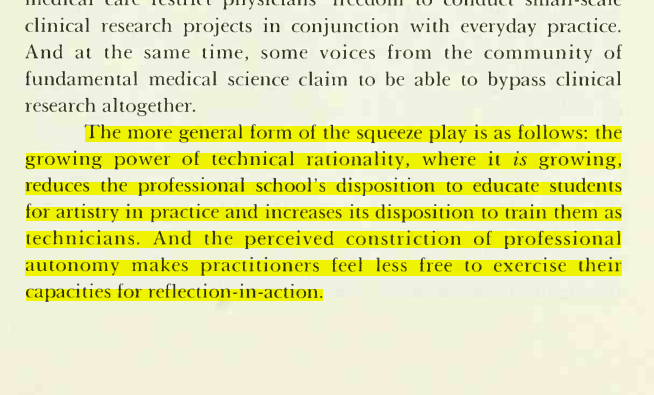
OK. Restarting this thread after almost 2 years.
I found the name of the play. It is "True Cut" by @DavidJAlderson. entandaudiologynews.com/features/ent-f…
It took me a good 15-30 minutes of detective work to find it.
I found the name of the play. It is "True Cut" by @DavidJAlderson. entandaudiologynews.com/features/ent-f…
It took me a good 15-30 minutes of detective work to find it.
https://twitter.com/DrAndrewHuang/status/1194039825264865280?s=20
I've backtracked to the start of the chapter because it's been so long. Schon is highlighting the tension between discipline and practice-orientations to education. He menions Veblen. 

en.wikipedia.org/wiki/Thorstein…
Veblen was an economist and sociologist. He was also a critic of capitalism. Also wrote about "conspicuous consumption". Looks like he's right up my alley! 🤣
Veblen was an economist and sociologist. He was also a critic of capitalism. Also wrote about "conspicuous consumption". Looks like he's right up my alley! 🤣
I found an exposition of Veblen's theory in this paper. jstor.org/stable/4228111…
It's interesting reading this chapter again. What sticks out to me has changed as I'm 2 years more experienced and engaged in the literature.
Here Schon echoes Freire with knowledge transfer- the banking model of education
Here Schon echoes Freire with knowledge transfer- the banking model of education
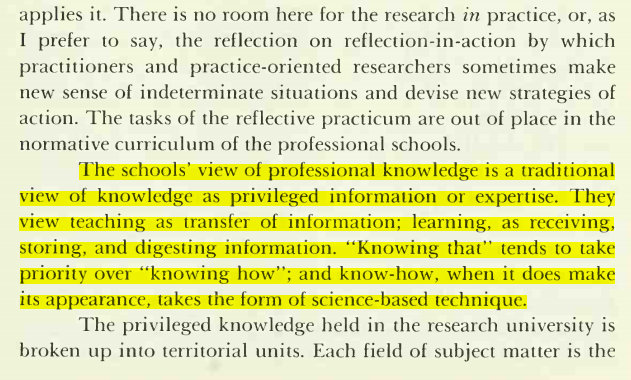
This quotation reminds me of the Netflix show The Chair about a single, female, Korean American English professor who comes head of dept. 
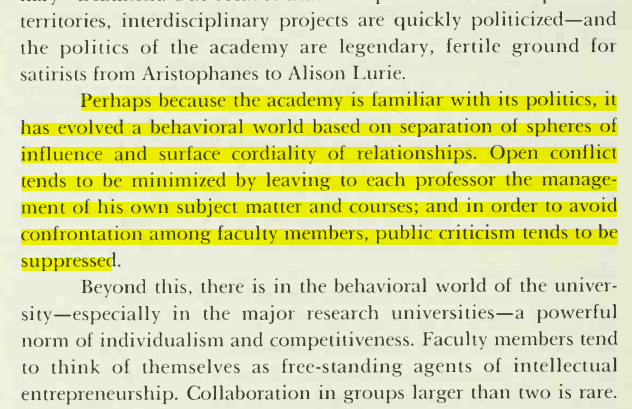
"Total institution" - haven't heard of this before. But I see metaphors of the old "residency" where residents actually lived in the hospital, and concepts of identity formation in these highlighted sections. 

The battle between technical rationality and the psychosocial is very much alive, at least in Pain Medicine. Schon writes about uncertainty.
Ties in with a conversation I've been having with @jamestoml1
Ties in with a conversation I've been having with @jamestoml1

Schon uses three case studies to explain the squeeze play. A school of education, a business school, and an engineering school. He describes reductionist quantitative research v qualitative "field research" paradigms. 

Schon sees higher education and applied education practitioners coming together to try to collaborate together. He outlines how he sees some of his vision being outworked. 

Before I dive into the last chapter... I do wonder, it feels like a dichotomy - between relevance & rigour. Reminds me of the heated debates about whether anatomy should be a stand-alone subject, integrated into the system, or picked up by osmosis through problem-based learning
But does it have to be a dichotomy? Is this just typical western thinking? Can it be both? Is there a way to have your cake and eat it too? Is there a place for eastern philosophy? e.g. yin and yang?
Here is that tension. The "high degree of ambiguity and instability in what counts as professional knowledge" points to its contested nature, and the question of how to best teach or develop it. 

This chapter is really a case report of Schon's own experiences in redesigning a curriculum for the Master of City Planning at @MIT. The link is the legacy of his and his collaborators' work in the late 1970s and early 1980s.
dusp.mit.edu/degrees/masters
dusp.mit.edu/degrees/masters
Given the MD program at @UniMelb is currently undergoing redesign, I wonder if @SteveTrumble might find Chapter 12 useful?
Schon outlines the history leading up to the curriculum redesign at MIT - from having core subjects in the 50s and 60s to giving students more choice that by the 70s it was perceived as "anarchy". 

This paragraph echoes some of the things that are important in #MedEd. We've got no idea where medicine will be in 30 or 50 years time. How do we equip future doctors with the capability &capacities to deal with tomorrow's pressing issues? How did Schon and collaborators do it? 
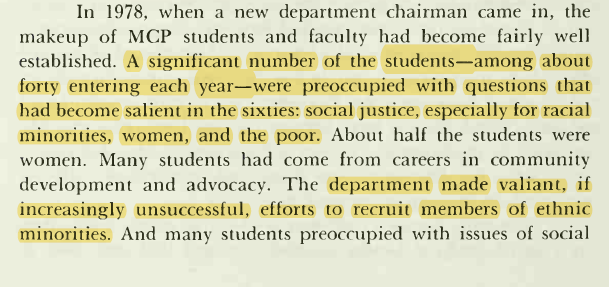
In response they formed a review committee that consisted of a minority of faculty members and a majority of students. The process was transparent and public.
This paragraph highlights another tension between what I think is "head" or theoretical knowledge, and more practical "applied" or situated knowledge. 
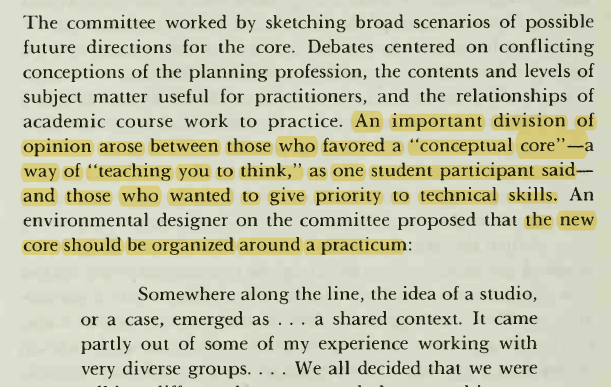
"The committee's final report proposed an "ideal" scenario that included a "conceptual" approach to course content, supplemented by skill-building sequences, some compromise on issues of "coherence versus flexibility,"...
"...contexts in which students had greater access to faculty members, "time for reflection" in smaller groups, pass/fail grades, and a recommendation that the "controversial issues" be included as a top priority."
Schon goes on to outline how they went about the process of redesign. He highlights some of the conflict during the engagement process. 

The practicum that they tried to implement reminds me of flipped classrooms - where the students engage and wrestle with the ideas that they have learnt. 

Really interesting. Faculty members attended other faculty's lectures. Makes it a bit of a panel discussion. Points to co-construction of knowledge and formation of a community of practice. 

The studio practicum allowed the free-flow of ideas and a student-teacher and teacher-student relationship to form, perhaps like that envisaged by Freire. 

This comment seems to suggest that some of them felt beyond what Vygotsky would term their zone of proximal development. 
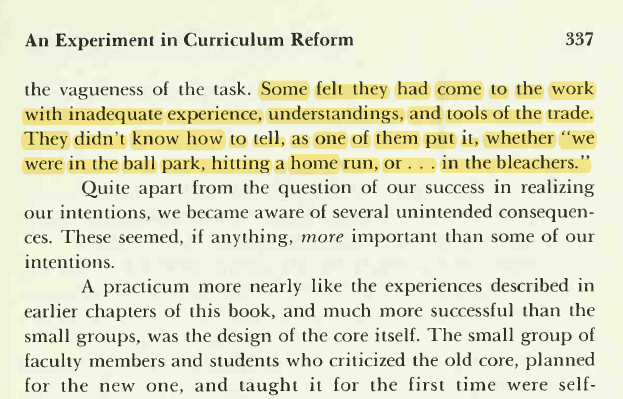
The unintended consequences were often more important.
Schon points to the importance of engagement with the work and with each other in the redesign.
Schon points to the importance of engagement with the work and with each other in the redesign.

It looks like the committee themselves became more reflective in designing the reflective practicum. They were able to reflect and appreciate what the others were saying, and perhaps built trust in engaging with each other. 

I wonder if this is a phenomenon associated with assessment.
e.g.Some trainees have come up with ideas for research, but turfed them as soon as they get onto the training program because they enter study mode. So rather than creators of knowledge, they become temporary absorbers.
e.g.Some trainees have come up with ideas for research, but turfed them as soon as they get onto the training program because they enter study mode. So rather than creators of knowledge, they become temporary absorbers.

"the more we integrate in a curriculum the knowledge and skills that students, in our judgment, need to learn, the more we make it difficult for them to function as reflective designers of their own education." 

Thus ends my reading of Schon's Educating the Reflective Practitioner.
@threadreaderapp unroll please.
@threadreaderapp unroll please.
• • •
Missing some Tweet in this thread? You can try to
force a refresh



